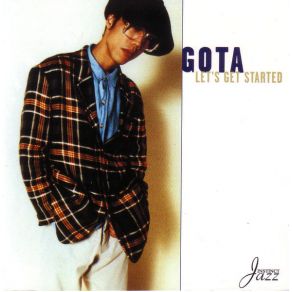Let's Get Started
Download links and information about Let's Get Started by Gota. This album was released in 1999 and it belongs to Electronica, Jazz, Bop, Smooth Jazz genres. It contains 10 tracks with total duration of 46:22 minutes.

|
|
|---|---|
| Artist: | Gota |
| Release date: | 1999 |
| Genre: | Electronica, Jazz, Bop, Smooth Jazz |
| Tracks: | 10 |
| Duration: | 46:22 |
| Buy it NOW at: | |
| Buy on iTunes $9.90 | |
| Buy on Amazon $8.99 | |
Tracks
[Edit]| No. | Title | Length |
|---|---|---|
| 1. | Let's Get Started | 4:07 |
| 2. | Time, There Will Always Be Time | 5:49 |
| 3. | In the City Life | 3:55 |
| 4. | If I Could | 4:01 |
| 5. | Riding 'Til Dawn | 5:05 |
| 6. | We'd Better Move On | 5:11 |
| 7. | Will You Ever Know | 4:39 |
| 8. | Don't You Tell (It's Too Late) | 3:57 |
| 9. | Island Farewell | 4:13 |
| 10. | No More Tears | 5:25 |
Details
[Edit]Percussionist/producer Gota Yashiki's pop résumé — everything from playing on Seal's "Kiss from A Rose" to creating all the instrumentation for Sinéad O'Connor's "Nothing Compares to U" — informs us of his deep sense of sonic texturing, but hardly prepares us for the intense acid jazz experience his own band generates. While the groove on Let's Get Started is non-stop retro-styled funk (complete with wah wah, Fender Rhodes harmony, and dense electronic beats) throughout, the real joy of this immensely danceable release comes from the unpredictable relay race of instruments which carry the melodies. On "Will You Ever Know," for instance, a spacey lead synth melody pulls back for a brisk, echoing synth vibes solo, which in turn leads to a playful high-register improvisation by pianist Neil Cowley. "Don't You Tell (It's Too Late)" adds the flourishes of a five-piece NFC Horns section to the more conventional sax melody of Ian Kirkham, and has a tight, Lee Ritenour flavored guitar intertwined with the wah wah which helps form the foundation of the groove. Another tune Yashiki coordinates like a coach married to the concept of teamwork is "In the City Life," which features a rising then shrinking horn section harmony and solos from, in quick succession, the sax, flute and trumpet. Busy jams like "Time, There Will Always Be Time" — with its throbbing, in your face hypnotic weaving of rock guitar, wah wah, flute, trumpet and shuffling beats — are nicely balanced by gentler expressions like "Island Farewell," a mid-tempo ballad whose laid-back melody lines switch between trumpet and sax (sometimes to echoing effect) over a bubbling Fender Rhodes vibe. It's hard to find grace on acid jazz recordings but the cool and bluesy closer "No More Tears" functions as a calmer reflection on the playful insanity that precedes it.